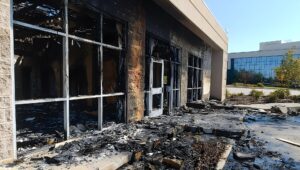Handling biohazard cleanup requires strict adherence to safety and legal guidelines. Situations involving biohazard materials, such as bodily fluids, chemicals, and infectious substances, can pose serious health risks if improperly managed. Therefore, knowing the necessary precautions, following rigorous legal and safety standards, and, ideally, involving professionals are critical steps for any property owner facing biohazard situations. This article covers the most common biohazard cleanup scenarios, the crucial legal standards involved, and why professional biohazard cleanup services Santa Rosa ensure both physical and legal safety.
What is Biohazard Cleanup?
Biohazard cleanup is the removal, sanitization, and disposal of materials that may pose a threat to health or safety. It generally includes dealing with substances that are potentially infectious or toxic.
It’s important to know how to identify and deal with biohazards so that you can keep yourself and others safe! Some common scenarios necessitating biohazard cleanup include:
Crime and Trauma Scene Cleanup
In cases of crime or trauma, cleaning up the aftermath involves more than just removing visible blood or bodily fluids. Biohazard cleanup professionals must ensure that all traces of pathogens are eliminated to prevent infection or contamination risks.
Key Considerations
Bloodborne pathogens like hepatitis, HIV, and other infectious diseases can survive for hours to days outside the body. Legal and safety protocols mandate careful disinfection to eliminate these pathogens.
Unattended Death Cleanup
When someone passes away and goes undiscovered for days or weeks, the decomposition process can create a hazardous environment. Decomposing tissue releases gases and fluids that may lead to mold growth, foul odors, and potential exposure to harmful bacteria.
Key Considerations
Handling decomposition requires specialized cleaning agents and equipment to ensure complete decontamination. A professional team trained in handling these cases ensures adherence to legal and health standards including how to dispose of blood and body fluids safely.
Industrial Accidents
Factories and warehouses are at risk for various industrial accidents, which may involve exposure to harmful chemicals, spills, or physical trauma. Spills of hazardous materials or exposure to dangerous machinery can create environments needing urgent and expert biohazard cleanup.
Key Considerations
Biohazard cleanup following an industrial accident ensures that any chemical or biohazard spill is managed safely, reducing the risk of further injury or contamination and adhering to OSHA guidelines.
Legal Standards in Biohazard Cleanup
Biohazard cleanup falls under several strict regulations enforced by state and federal agencies, including OSHA, the EPA, and in some cases, the CDC. Here’s a closer look at some of these regulations:
OSHA Bloodborne Pathogen Standard
OSHA’s Bloodborne Pathogen Standard mandates that any exposure to blood or bodily fluids in the workplace must follow strict guidelines to prevent the transmission of infectious diseases. This standard is essential for preventing illness and for maintaining legal compliance during biohazard cleanup.
Requirements include:
Use of Personal Protective Equipment (PPE)
All cleanup personnel must wear gloves, face shields, and other protective gear.
Training
Employees handling biohazards must undergo OSHA-approved training on bloodborne pathogen risks and cleanup procedures.
Record-Keeping
Any incident involving exposure must be recorded for compliance and liability purposes.
Hazard Communication Standard
This standard ensures that all employees are informed of hazardous chemicals they may be exposed to, whether directly or indirectly. It requires employers to:
Label Hazardous Materials
Proper labeling and classification of any potentially dangerous substances.
Provide Safety Data Sheets (SDS)
An SDS must be readily accessible for any chemicals used during cleanup.
Employee Training
Personnel must be informed and trained on how to handle and clean up these hazardous materials safely.
EPA Regulations for Disposal
Biohazardous waste cannot be disposed of in standard trash; it must be carefully packaged and transported to certified disposal facilities. Proper disposal from a professional who knows what the biohazard cleanup process is and why it’s dangerous can protect your health and legal standing. Failure to comply can lead to fines and legal consequences.
State and Local Regulations
In addition to federal standards, many states have specific laws governing biohazard cleanup, particularly regarding unattended deaths, trauma scenes, and hoarding. Local health departments may also have ordinances that dictate how these incidents are managed and reported.
Safety Standards for Biohazard Cleanup
Biohazard cleaning services can help you surpass awful events safely. Professional biohazard cleanup companies, like West Coast Fire & Water, follow rigorous safety standards to minimize the risk of contamination or infection. Key safety measures include:
Personal Protective Equipment (PPE)
Proper PPE, including gloves, face shields, and respirators, is essential to protect cleanup professionals from direct exposure.
Ventilation and Containment Protocols
Proper containment prevents contaminants from spreading to other areas, and ventilation removes potentially toxic fumes.
Specialized Cleaning Agents and Equipment
Strong disinfectants, air scrubbers, and odor neutralizers are required to ensure thorough decontamination and odor removal.
Adherence to OSHA and CDC Guidelines
Strict adherence to guidelines from OSHA and CDC ensures not only safety but also legal compliance in the cleanup process.
Certification and Training
Professional biohazard cleanup teams undergo extensive training to respond quickly, safely, and in compliance with all legal standards.
Why Hiring Professional Biohazard Cleanup Services is Essential
Attempting biohazard cleanup without professional help is not only hazardous but also legally risky. There are several key advantages for why you should hire a professional biohazard cleanup company, including:
Expertise and Compliance
Professionals have the training, certifications, and knowledge required to comply with OSHA, EPA, and state regulations.
Safe and Thorough Decontamination
With specialized equipment and techniques, professional teams can eradicate biohazards completely.
Proper Disposal and Documentation
Certified companies ensure biohazard materials are disposed of in compliance with legal requirements and can provide documentation needed for insurance and legal purposes.
Reduced Liability
Hiring certified professionals minimizes potential liability, as improperly handled cleanup can lead to health hazards, fines, or lawsuits.
For Biohazard Cleanup Call the Pros – West Coast Fire & Water
West Coast Fire & Water’s biohazard cleanup team is certified, experienced, and equipped to handle even the most challenging biohazard scenarios safely and efficiently. For all biohazard cleanup services in Santa Rosa and beyond, we follow strict regulatory standards to ensure your space is restored safely, helping you avoid health risks and legal repercussions.
Don’t risk health or liability—contact West Coast Fire & Water today or give us a call at 707-462-5326 for comprehensive, compliant, and compassionate biohazard cleanup. Your safety and peace of mind are our top priorities.


